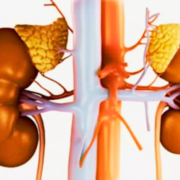Albuminuria, Not Kidney Function, Predicts Future Cancer Risk, reveals study

Researchers have determined in a new study that albuminuria, and not diminished kidney function, is independently associated with a greater risk of cancer development. The research, involving more than 1.3 million participants in 54 global cohorts, showed albuminuria levels to be associated consistently with site-specific and overall cancer risk, while eGFR had no apparent correlation with the majority of cancers. The study was published in the British Journal of Cancer by Yejin M. and colleagues.
Chronic kidney disease (CKD) is prevalent all over the world and generally evaluated with two significant markers: eGFR, which is a measure of kidney function, and albuminuria, which is a measure of kidney damage. Because both CKD and cancer have common risk factors of age, hypertension, diabetes, and inflammation, it is necessary to determine if markers of CKD independently are predictive of cancer.
This participant-level data meta-analysis involved 54 cohorts with full data on albuminuria (defined as urine albumin-to-creatinine ratio [ACR]) and eGFR and on cancer incidence. A total of 1,319,308 participants were included, all aged 18 years or more, with no history of cancer or end-stage kidney disease at baseline. Both overall and site-specific cancer outcomes were examined after adjustment for established cancer risk factors.
Statistical analyses included adjusted hazard ratios (HRs) for cancer incidence related to ACR and eGFR changes, in addition to 1-year landmark analysis to control for early detection bias.
Results
-
Incidence of overall cancer during follow-up was 17.3 per 1000 person-years.
-
Albuminuria: Increased ACR was significantly associated with increased cancer risk. Namely, with each 8-fold rise in ACR, the HR for cancer adjusted was 1.08 (95% CI 1.06–1.10). This correlation remained across various cancers.
-
eGFR: There was no significant correlation between decreased eGFR and cancer risk overall. Reduced eGFR was associated, however, with urological cancers and multiple myeloma increased risk.
-
Site-specific associations: Increased ACR correlated with increased risk for various cancers, such as kidney, head and neck, colorectal, liver, pancreas, bile duct, stomach, larynx, lung, hemolymphatic cancers, leukemia, and multiple myeloma.
-
Robustness check: Results were replicated in 1-year landmark analysis, reducing the risk of reverse causality.
Patients with increased urine albumin had a higher risk of developing a broad variety of cancers, highlighting albuminuria as an essential biomarker for cancer prediction. These results necessitate further studies into pathways between albuminuria and cancer and indicate that monitoring albuminuria routinely can have implications greater than kidney disease control.
Reference:
Mok, Y., Surapaneni, A., Sang, Y. et al. Chronic kidney disease and incident cancer risk: an individual participant data meta-analysis. Br J Cancer (2025). https://doi.org/10.1038/s41416-025-03140-z
Powered by WPeMatico







